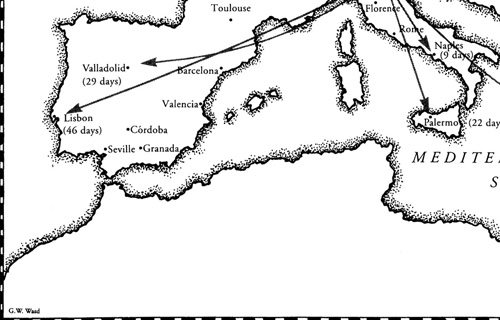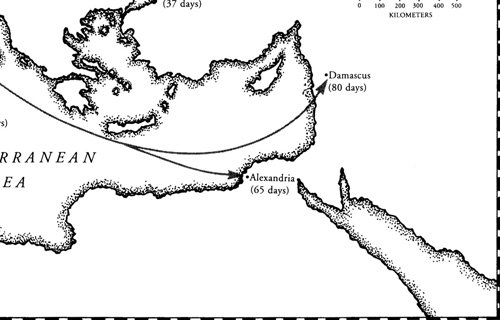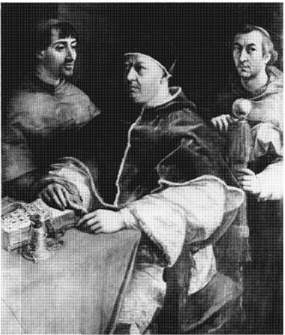A World Lit Only by Fire (27 page)
Read A World Lit Only by Fire Online
Authors: William Manchester


Penetrating the essence of the peasants’ faith is difficult. Essentially it was belief in the supernatural. The lower orders
of parochial clergy were regarded with contempt but also with affection. Bishops and archbishops, on the other hand, were
less popular. In a study of Luther’s homeland on the eve of his rise, Johannes Janssen, himself an eminent Catholic, found
the prelates there obsessed with “worldly greed,” while “preaching and the care of souls were altogether neglected.” And,
unlike priests faithful to their
Konkubinen
, they were notoriously promiscuous, sometimes traveling to federal or imperial diets with several mistresses in tow. The
peasants’ view of the pope is harder to define. They revered him, but not as the Vicar of Christ. He was more like a great
magician. Now his powers had been impeached by a lowly Augustinian theologian. They expected a vengeful response. Its potency
would sway their allegiance. If the pontiff’s magic failed, they would begin to turn away from him.
In defying the organized Church, Luther had done something else. He had broken the dam of medieval discipline. By his reasoning,
every man could be his own priest, a conclusion he himself would reach in 1520–1521. Moreover, as fragmentary accounts of
the Gospels began to circulate, the peasantry learned that the sympathies of Christ and his apostles had lain with the oppressed,
not with the princes who had presumed to speak in his name. Because church and state were so entwined in central Europe, Luther’s
challenge to ecclesiastical prestige encouraged a proletariat eager to demand a larger share in an increasingly prosperous
Germany. Soon a pamphlet titled
Karsthans
(
Pitchfork John
) appeared in rural villages, pledging Luther the protection of the peasants. The assumption that he had become their champion
was implicit.
The views of the upper classes were very different. Before the succession of disastrous popes their commitment to the Catholic
hierarchy and the order of temporal life had been unwavering. Their lives were still guided by the dogmas of the Church, but
the corruption in Rome and the flagrant misconduct of the clergy had angered them. It was also their “general opinion,” in
the words of Ludwig Pastor, “that in the matter of taxation the Roman Curia put on the pressure to an unbearable degree. …
Even men devoted to the Church and the Holy See … often declared that the German grievances against Rome were, from a financial
point of view, for the most part only too well founded.” Now they listened attentively to the sermons of Luther’s disciples
touring Austria, Bohemia, Saxony, and the Swiss Confederation. The patricians, too, awaited a strong response from Rome.

O
N
A
PRIL
24, 1518, the German Augustinians, meeting in Heidelberg, relieved Luther of his duties as district vicar. It was a show
of confidence, not a reprimand, and he used his new freedom well, delivering a closely reasoned denunciation of Scholastic
doctrine as a pretentious “theory of glory.” Printed copies were circulated across the Continent and discussed in widening
circles, including the humanist community. Since the turn of the century humanist leaders had awaited a distinguished theologian
with the courage to label Scholasticism as anti-intellectualism parading mindless shibboleths as philosophy. German scholars
now published a sheaf of leaflets proclaiming themselves Lutherans.
In England John Colet, who had seen the revolt coming—yet whose loyalty to the papacy would remain unshaken throughout the
coming tumult—saw the Curia engrossed not with good works and repentance, but with the size of the fees it could exact.
Luther was discovering that he had become the voice of millions who suffered doubly from the Renaissance popes; impoverished
by highwaymen like Tetzel, they also grieved for their beloved faith, desecrated by rogues in vestments. From this point forward,
his wrath and theirs would join, gathering in volume and strength as together they confronted the most powerful symbol of
authority Europe had ever known. Both sides would invoke the name of Christ, but in Germany, where first blood was being drawn,
the spectacle invited parallels, not with the New Testament, but with
Das Lied vom huren Seyfrid
, the pagan fable first heard by Luther as a child, which reaches its climax when Siegfried buries his gory ax in the dragon
Fafnir.
The gauntlet had been flung, but Pope Leo merely toyed with it. Archbishop Albrecht, alarmed, sent the theses from Mainz to
Rome accompanied by a forceful request that Luther be formally disciplined. Leo misinterpreted the challenge. Dismissing it
as another dispute between Augustinians and Dominicans, he turned the matter over to Gabriel della Volta, the vicar general
of Luther’s order, instructing him to deal with it through channels, in this case Johann von Staupitz, the Augustinian responsible
for Wittenberg. Della Volta’s order may have wound up in some curial pigeonhole or file. Certainly it never reached Staupitz.
In effect, the papacy had ignored the defiance in Wittenberg.
Elsewhere, however, the Catholic reaction was vehement. The universities of Louvain, Cologne, and Leipzig, strongholds of
theological tradition, condemned the theses in their entirety. And Tetzel, feeling himself libeled, had decided to reply.
Because he was an illiterate and ignorant of virtually every principle at stake, the Dominicans had appointed a theologian,
Konrad Wimpina, as his collaborator, and in December 1517
One Hundred and Six Anti-Theses
had appeared in Frankfurt under Tetzel’s name. Unapologetic, unyielding, the friar defended his distributions of cut-rate
salvation in an argument later described in the
Catholic Encyclopedia
as giving “an uncompromising, even dogmatic, sanction to mere theological opinions that were hardly consonant with the most
accurate scholarship.” The following March a hawker offered eight hundred copies of the leaflet in Wittenberg. University
students mobbed him, bought the lot, and burned them in the market square.
Luther counterattacked in a tract,
Indulgence and Grace
. Now the rebelliousness in his tone was unmistakable: “If I am called a heretic by those whose purses will suffer from my
truths, I care not much for their brawling; for only those say this whose dark understanding has never known the Bible.” In
the Curia wise men, realizing that Tetzel had become an embarrassment, told Leo that he had to go. The pope, agreeing, received
Karl von Miltitz, a young Saxon priest of noble lineage now serving in Rome. Once the dust had settled, he told Von Miltitz,
he wanted him to travel north and unfrock the discredited friar.

B
UT ABANDONING
T
ETZEL
now—with orthodox German theologians fiercely defending him—was out of the question. Archbishop Albrecht had privately
reprimanded the salesman for his excesses. In public, however, the leadership of the Catholic establishment there closed its
ranks and its minds, refusing to discuss compromise. In Rome, a German archbishop called for heresy proceedings against Luther,
and the Dominicans demanded his immediate impeachment. Dr. Johann Eck, vice chancellor of Ingolstadt University and perhaps
the most eminent theologian in central Europe, attacked the theses in a leaflet,
Obelisks
, accusing their author of subverting the faith by spreading “poison.” The Curia’s censor of literature, concurring, issued
a
Dialogue
reaffirming “the absolute supremacy of the pope,” and Jakob van Hoogsträten of Cologne demanded Luther be burned at the stake.
Instead he kept scratching away with his pen. In April 1518, the month after Eck’s blast, he published
Resolutiones
, a curious brochure whose ostensible purpose was to assure the Church of his orthodoxy and submission. In a copy sent to
the pontiff he offered “myself prostrate at the feet of your Holiness, with all I am and have. Quicken, slay, call, recall,
approve, reprove, as may seem to you good. I will acknowledge your voice as the voice of Christ, residing and speaking in
you.” Yet this inscription was wholly inconsistent with the text that followed.
Resolutiones
implicitly denied the pontiff’s supremacy, suggesting he was answerable to an ecumenical council. The pamphlet went on to
slight relics, pilgrimages, extravagant claims for the powers of saints, and the holy city (“Rome … now laughs at good men;
in what part of the Christian world do men more freely make a mock of the best bishops than in Rome, the true Babylon?”).
He declared the very foundation of the Curia’s indulgences policy—stretching back over three centuries—null and void.
The monk of Wittenberg was growing ever more confident, and as his confidence grew, so did his feelings of independence.
Leo was stunned. Abandon indulgences? Just as his pontificate was approaching bankruptcy? He was rebuilding a cathedral, waging
wars, funding elaborate dinner parties while trying to keep Raphael, Lotto, Vecchio, Perugino, Titian, Parmigianino, and Michelangelo
in wine. The Curia, juggling budgets, was swamped with bills. And now a German monk—a mere friar—had the audacity to condemn
a prime source of Vatican revenue. The Holy Father summoned Martin Luther to Rome.
The invitation was declined. Acceptance might mean the stake—there were plenty of precedents for that. At the very least
Luther might be assigned to an obscure Italian monastery, where, within a year, he and his cause would be forgotten. Instead
he appealed to Frederick the Wise, submitting that German princes should shield their people from extradition. The elector
agreed. He liked his controversial Augustinian. (One reason was that Luther’s Wittenberg duties included keeping the university’s
books; unlike Leo, he had never resorted to red ink.) And
